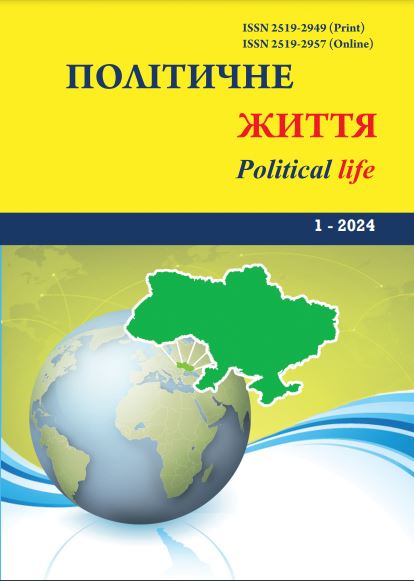Key aspects of humanitarian policy as countermeasure to information warfare by the russian federation
DOI:
https://doi.org/10.31558/2519-2949.2024.1.14Keywords:
humanitarian policy; Russia’s full-scale war against Ukraine; media literacy; information warfare; fakes; post-truth; educational and cultural practicesAbstract
The article delves into the specifics and fundamental aspects of the functioning of humanitarian policy as one of the key factors in countering the information warfare waged by the Russian Federation against Ukraine. It has been established that in the battle against multifaceted and potent forms of information aggression, a pivotal strategy involves prioritizing humanitarian policy. This is particularly pertinent when defending civil rights, nurturing cultural and educational domains, and fostering societal cohesion. Several key considerations in this endeavor include: 1. promotion of humanitarian values – a proactive role for the state in championing and supporting humanitarian values such as tolerance, equality, and respect for human rights. 2. development of educational and cultural initiatives – implementation of programs fostering understanding and mutual appreciation between diverse cultures and nationalities. 3. safeguarding citizens’ rights and freedoms – authorities taking on the responsibility of protecting fundamental rights and freedoms, encompassing freedom of speech, the right to information, and privacy. 4. enhancement of media literacy – initiatives aimed at enhancing media literacy among the populace are imperative. individuals possessing heightened media literacy are less susceptible to manipulation and can critically evaluate information, acting as a robust defense against information aggression. 5. international collaboration and diplomacy – collaborative efforts and diplomatic endeavors for the exchange of best practices in humanitarian policy and countering information aggression. 6. provision of humanitarian assistance – ffering humanitarian aid and support to those victimized by information aggression. humanitarian policy emerges as a potent tool in the fight against information aggression, emphasizing societal development, human rights protection, and the integration of cultural and educational initiatives.
References
Grebnev, G. (2023). The information aspect of Russia’s hybrid war against Ukraine, Ukrainian Information Space, 1(11), 107-118. https://doi.org/10.31866/2616-7948.1(11).2023.279598 [in Ukrainian].
Humanitarian policy in Ukraine: challenges and prospects (2020). Analyst add. [Sinaiko O. O. (head of author’s group), Tyshchenko Yu. A., Kaplan Yu. B., Mykhailova O. Yu., Valevskyi O. L. and others]. Kyiv: NISD, 126 р. [in Ukrainian].
Dutsyk, D. (2023). The formation of social stability and critical media literacy – before and during the war, Ukraińskie media w obliczu wojny : regulacje prawne i przyskie = Ukrainian media in the conditions of war: legal norms and experience / redakcja naukowa Agnieszka Glapiak. – Warszawa : Wydawnictwo Akademii Sztuki Wojennej, 241-248 [in Ukrainian].
Patlashynska, I. V. (2022). Modern Russian-Ukrainian information war: tasks, methods and features of use. Regional Studies, No. 28, 84-87 [in Ukrainian].
Aro, J. (2022). Putin’s Trolls: On the Frontlines of Russia’s Information War Against the World. IG Publishing, 336 р.
Clack, Τ., & Johnson, R. (2021). The World Information War: Western Resilience, Campaigning, and Cognitive Effects. Routledge, 300 р.

